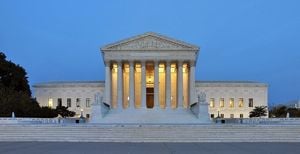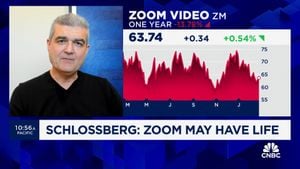U.S. lawmakers are raising alarms over Hong Kong's transformation from a reliable global financial center to what they describe as a hub for financial crime. Their concerns have been amplified following the enactment of the national security law by Beijing, which they believe has enabled the semi-autonomous city to engage more actively in illicit activities, including money laundering and sanction evasions.
On Monday, bipartisan members of the House Select Committee on the Chinese Communist Party expressed their worries through a letter directed at Treasury Secretary Janet Yellen. They urged the U.S. government to reevaluate its banking ties with Hong Kong, highlighting the territory's "increasing role" as it has shifted to align more closely with the authoritarian regimes of China, Russia, Iran, and North Korea.
The lawmakers emphasized the need for reassessing Hong Kong's unique trade privileges, which have historically provided the city economic benefits distinct from mainland China. They argued these privileges might no longer be justifiable due to the changes brought about by the national security law, implemented to quell dissent following significant pro-democracy protests.
"We must question whether longstanding U.S. policy toward Hong Kong, particularly concerning its financial and banking sector, remains appropriate amid these developments," the letter stated. The committee referenced research indicating Hong Kong's pivotal role in facilitating transactions and technologies banned by Western countries.
Concerns have escalated over claims by lawmakers asserting Hong Kong acts as a conduit for shifting banned Western technology, especially to Russia. The committee detailed allegations of the city enabling the establishment of front companies to buy Iranian oil and managing ghost ships purportedly involved in illegal trade with North Korea. Recent estimates suggest almost 40% of the goods shipped from Hong Kong to Russia this year belonged to U.S. and EU prohibited lists, including semiconductors and technology likely utilized for military purposes.
Historically, Hong Kong has prided itself on being at the forefront of international finance, maintaining its status as the third-largest financial center globally. This distinction faced substantial threats beginning with the handover from British sovereignty to China back in 1997, with promises of continued autonomy for fifty years under the “One Country, Two Systems” framework. Yet, the erosion of promised freedoms and the tightening grip of the Beijing regime has led to growing scrutiny from Washington.
"Hong Kong has shifted from being viewed as a reliable partner to becoming synonymous with the deepening authoritarian axis of the People's Republic of China and its allies," lawmakers stated, marking it as pivotal to understand the repercussions of these changes on global and U.S. financial systems.
The volatility surrounding Hong Kong's status is reflected in the recent advisory issued by the U.S. State Department warning businesses about the new risks of operating within its financial sector. It suggests potential deterioration of asset protections for foreign investments and increasing exposure to sanctions-related risks.
The U.S. government has, on several occasions, responded with sanctions targeted at individuals and businesses associated with various illicit activities emanated from Hong Kong. These sanctions aim to curtail the city’s capacity to operate as the financial engine it once was, particularly since the legislation by former President Donald Trump revoked the special treatment Hong Kong had enjoyed under U.S. law, positioning it on the same footing as mainland China.
The situation draws attention to the complex nature of international relations and the financial systems, with echoes of old alliances and new rivalries reshaping not only geopolitics but also economic landscapes globally.
While the U.S. grapples with these challenges, analysts warn of the broader implications on global financial systems, emphasizing how the character of financial hubs like Hong Kong shapes the dynamics of international trade and regulatory environments.
Governments around the world now find themselves at crossroads, tasked with balancing domestic interests with international obligations, amid narratives of freedom against the scourge of authoritarianism. With lawmakers sounding alarms, will the U.S. make definitive changes to its stance on Hong Kong, or does the financial interplay continue as usual, masked by political rhetoric? Time will tell as Washington navigates these murky waters.



